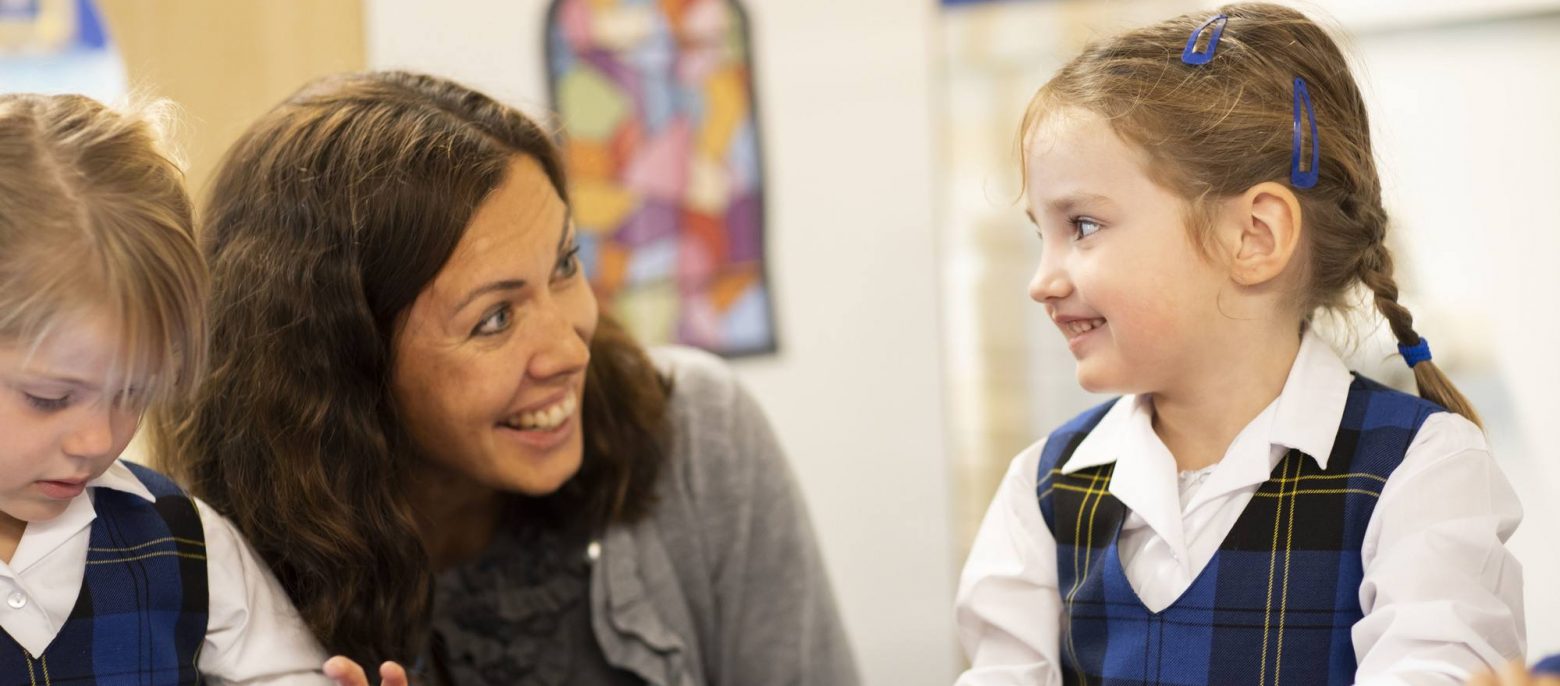Academic Subjects
English
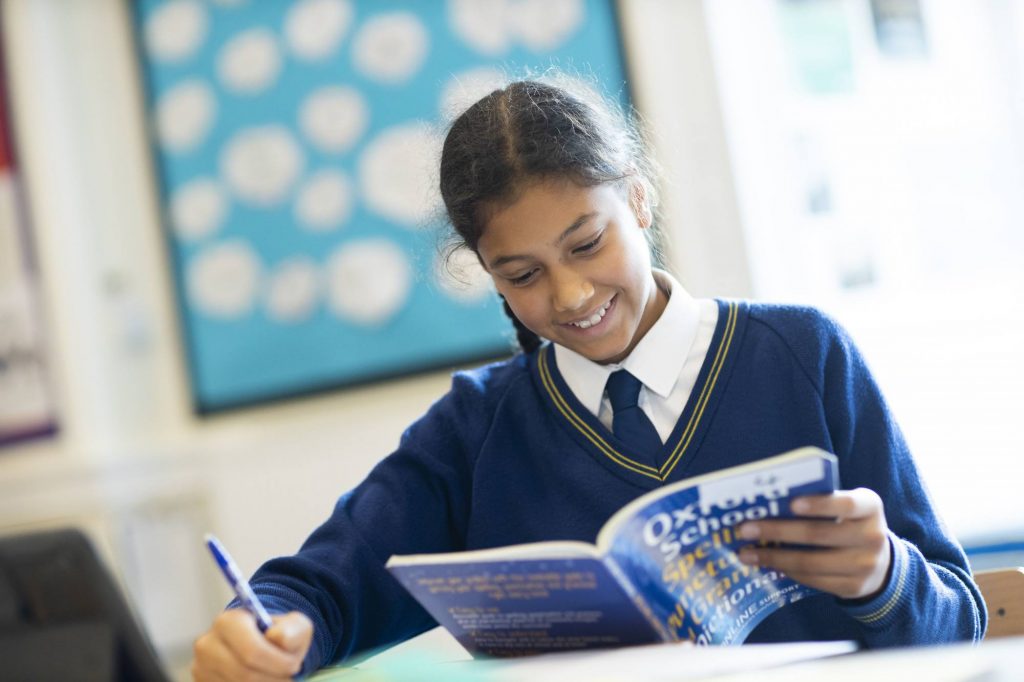
English
At Holy Cross Prep, we strive for excellence in English achievement throughout the school. Pupils’ reading, writing, listening and speaking skills are developed through cross-curricular teaching approaches and high standards of literacy are promoted in all lessons and subjects. We equip the girls with a strong command of the spoken and written word, as they develop a life-long love of literature through the enjoyment of reading.
Reading
Our priority is both the teaching of reading skills and the enjoyment of literature, enabling enthusiastic readers who will read for pleasure and purpose throughout their lives. As pupils begin to read, we focus on decoding, primarily through phonics, in addition to other strategies, such as whole word recognition, rhyme and context. As children build fluency, they focus on comprehension through developing their retelling, prediction and inference skills. As they become more proficient, they extend their reading to a wider range of fiction and non-fiction books, which they choose from our well-sourced library. We believe that high-quality literature is key to motivating children to read and instilling a love of reading; the girls are encouraged to read widely. Our specialist librarian is a constant source of advice, reviews and updates, responding to pupils’ requests and developing our ever-expanding e-book collection.
Writing Composition
Writing is a fundamental skill that extends across the curriculum, both in an academic and creative context. Pupils are taught to produce well-structured writing with appropriate detail, in which the meaning is clear and with which readers are engaged. The girls are encouraged to develop their cognitive skills, imagination and personal expression through a range of writing tasks using clear, concise language. Poets, storytellers and authors visit the school regularly to help inspire the girls. Writing is constantly celebrated in class, through displays and termly ‘Incredible Writer’ awards. There are opportunities throughout the year for pupils to submit their writing in national competitions, and we have also published our own anthology of poetry.
Handwriting
We are proud of our pupils’ handwriting and take particular care in our cursive handwriting style. We use Letter-join, which covers all the requirements of the National Curriculum, as the basis of our handwriting teaching. Handwriting is a basic skill that influences the quality of work throughout the curriculum. By the end of year 6, all pupils should have the ability to produce fluent, legible and speedy joined-up handwriting. We aim to make handwriting an automatic process that does not interfere with creative thinking.
Spoken Language
Spoken English underpins the development of reading and writing, which gives it an important role within the English curriculum. The ability to express ideas orally helps to improve the standard of our girls’ writing; they are encouraged to share and justify their ideas and opinions within all curriculum areas. We ensure that the girls have regular opportunities to speak in assemblies, services and Masses, as well as the chance to perform to larger, public audiences during their annual Christmas productions. Weekly ‘Talk Homework’ encourages family discussion on a range of topical, political and philosophical issues; this topic is advertised in our weekly newsletter, the ‘Friday Update’. Pupil voice is encouraged and heard through the School, Eco, STEM and Faith Councils, all of which further enhance the critical life skill of speaking confidently in public.
Geography
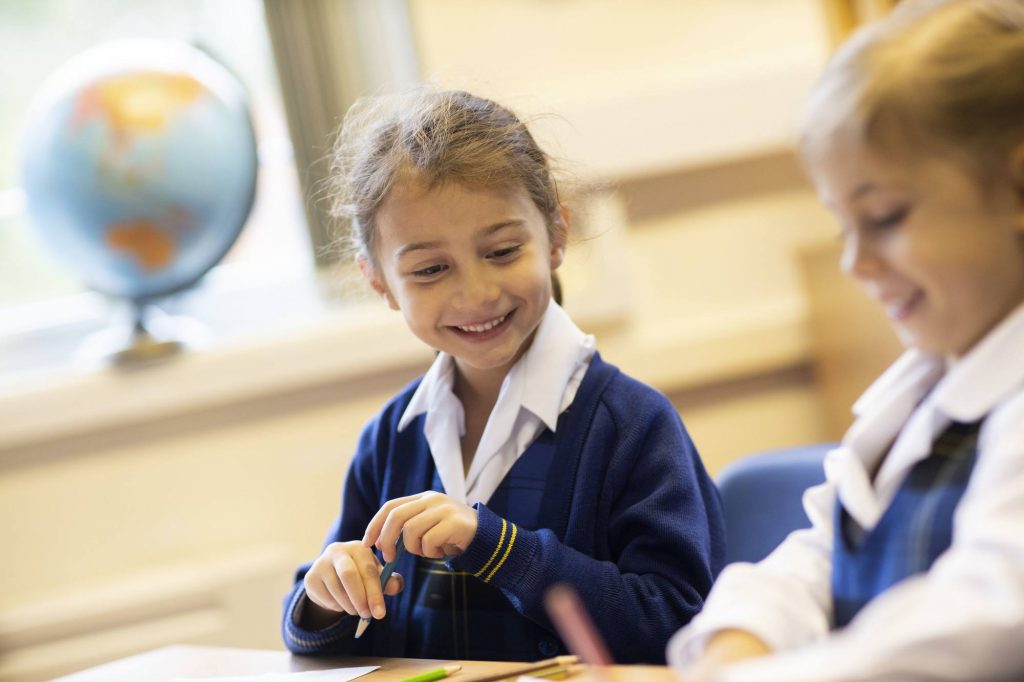
Geography
Our geography curriculum relates to the study of places, the human and/or physical processes that shape them, and the people who live in them. Our pupils study their local area, as well as places further afield in the UK, Europe and other parts of the world; they begin by considering what surrounds them in our school environment and grounds, as well as areas in close proximity to the school, for example the changing face of New Malden high street and the Hogsmill River. The year 5s undertake a residential field study to Dorset during the summer term to investigate the impressive Jurassic Coast.
Pupils develop the ability to communicate geographical knowledge and understanding – orally, visually and in writing using appropriate techniques and vocabulary. They develop subject specific enquiry skills by using globes, atlases, maps, plans and information books, as well as a wide range of online resources. Pupils are able to further enhance their knowledge of vocabulary and recording methods through the creation of maps and plans.
Geography provides our pupils with a greater understanding of, and respect for, the ways of life and cultures of people in other places, both near and far. By exploring the relationships between places and patterns of human activity, they are able to learn how humans have shaped and moulded their surroundings with varying effects. Geography fosters respect for the environment by addressing the earth’s resources and the impact of human activities; we ensure our pupils acquire the skills required to put forward questions and uncover answers to a variety of geographical issues, which will have a huge impact during their lifetime.

English
At Holy Cross Prep, we strive for excellence in English achievement throughout the school. Pupils’ reading, writing, listening and speaking skills are developed through cross-curricular teaching approaches and high standards of literacy are promoted in all lessons and subjects. We equip the girls with a strong command of the spoken and written word, as they develop a life-long love of literature through the enjoyment of reading.
Reading
Our priority is both the teaching of reading skills and the enjoyment of literature, enabling enthusiastic readers who will read for pleasure and purpose throughout their lives. As pupils begin to read, we focus on decoding, primarily through phonics, in addition to other strategies, such as whole word recognition, rhyme and context. As children build fluency, they focus on comprehension through developing their retelling, prediction and inference skills. As they become more proficient, they extend their reading to a wider range of fiction and non-fiction books, which they choose from our well-sourced library. We believe that high-quality literature is key to motivating children to read and instilling a love of reading; the girls are encouraged to read widely. Our specialist librarian is a constant source of advice, reviews and updates, responding to pupils’ requests and developing our ever-expanding e-book collection.
Writing Composition
Writing is a fundamental skill that extends across the curriculum, both in an academic and creative context. Pupils are taught to produce well-structured writing with appropriate detail, in which the meaning is clear and with which readers are engaged. The girls are encouraged to develop their cognitive skills, imagination and personal expression through a range of writing tasks using clear, concise language. Poets, storytellers and authors visit the school regularly to help inspire the girls. Writing is constantly celebrated in class, through displays and termly ‘Incredible Writer’ awards. There are opportunities throughout the year for pupils to submit their writing in national competitions, and we have also published our own anthology of poetry.
Handwriting
We are proud of our pupils’ handwriting and take particular care in our cursive handwriting style. We use Letter-join, which covers all the requirements of the National Curriculum, as the basis of our handwriting teaching. Handwriting is a basic skill that influences the quality of work throughout the curriculum. By the end of year 6, all pupils should have the ability to produce fluent, legible and speedy joined-up handwriting. We aim to make handwriting an automatic process that does not interfere with creative thinking.
Spoken Language
Spoken English underpins the development of reading and writing, which gives it an important role within the English curriculum. The ability to express ideas orally helps to improve the standard of our girls’ writing; they are encouraged to share and justify their ideas and opinions within all curriculum areas. We ensure that the girls have regular opportunities to speak in assemblies, services and Masses, as well as the chance to perform to larger, public audiences during their annual Christmas productions. Weekly ‘Talk Homework’ encourages family discussion on a range of topical, political and philosophical issues; this topic is advertised in our weekly newsletter, the ‘Friday Update’. Pupil voice is encouraged and heard through the School, Eco, STEM and Faith Councils, all of which further enhance the critical life skill of speaking confidently in public.

Geography
Our geography curriculum relates to the study of places, the human and/or physical processes that shape them, and the people who live in them. Our pupils study their local area, as well as places further afield in the UK, Europe and other parts of the world; they begin by considering what surrounds them in our school environment and grounds, as well as areas in close proximity to the school, for example the changing face of New Malden high street and the Hogsmill River. The year 5s undertake a residential field study to Dorset during the summer term to investigate the impressive Jurassic Coast.
Pupils develop the ability to communicate geographical knowledge and understanding – orally, visually and in writing using appropriate techniques and vocabulary. They develop subject specific enquiry skills by using globes, atlases, maps, plans and information books, as well as a wide range of online resources. Pupils are able to further enhance their knowledge of vocabulary and recording methods through the creation of maps and plans.
Geography provides our pupils with a greater understanding of, and respect for, the ways of life and cultures of people in other places, both near and far. By exploring the relationships between places and patterns of human activity, they are able to learn how humans have shaped and moulded their surroundings with varying effects. Geography fosters respect for the environment by addressing the earth’s resources and the impact of human activities; we ensure our pupils acquire the skills required to put forward questions and uncover answers to a variety of geographical issues, which will have a huge impact during their lifetime.
History
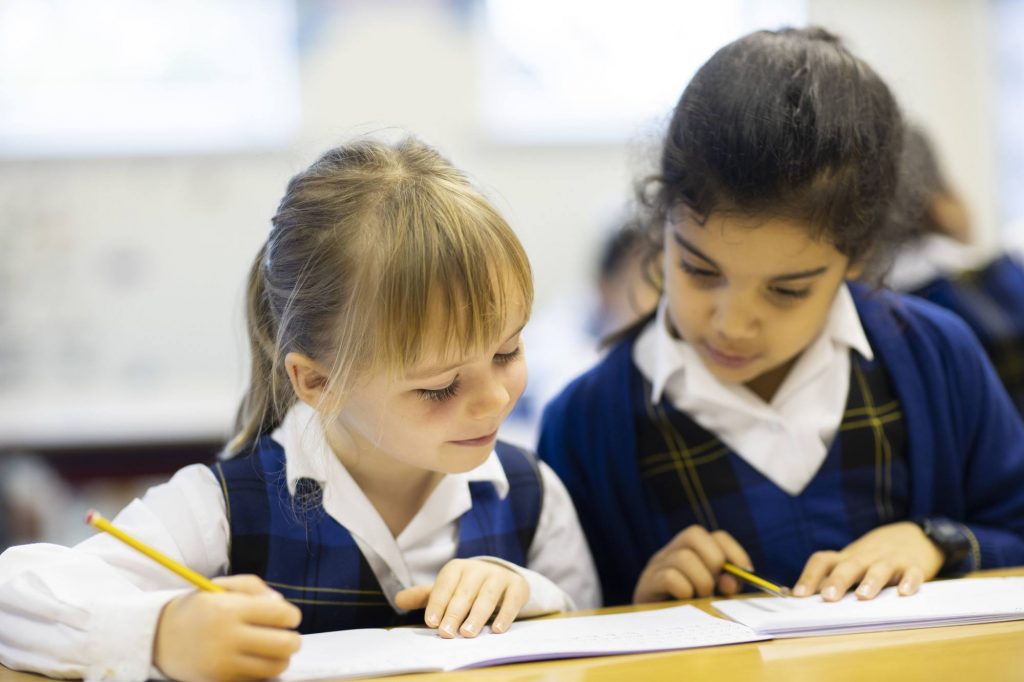
History
At Holy Cross Prep, our learning intention is to create a lively and exciting history curriculum, in which pupils learn to discover the past for themselves. Handling artefacts and looking at sources encourages children to make individual judgements and observations. Through a wide range of activities, including visits to historical sites, role-play, research, writing e-books and designing animations and posters, children can place themselves in history and make it ‘come alive’.
We inspire curiosity and questioning, encouraging pupils to think critically about the evidence and arguments presented to them. We want our girls to gain a clear understanding of Britain’s past, as well as the wider world. Pupils are equipped with a firm understanding of the challenges and changes different societies have experienced over time, and how these have shaped the society we live in today. We strive to develop a real love of history, alongside outstanding enquiry skills and, most importantly, open minds.
Maths
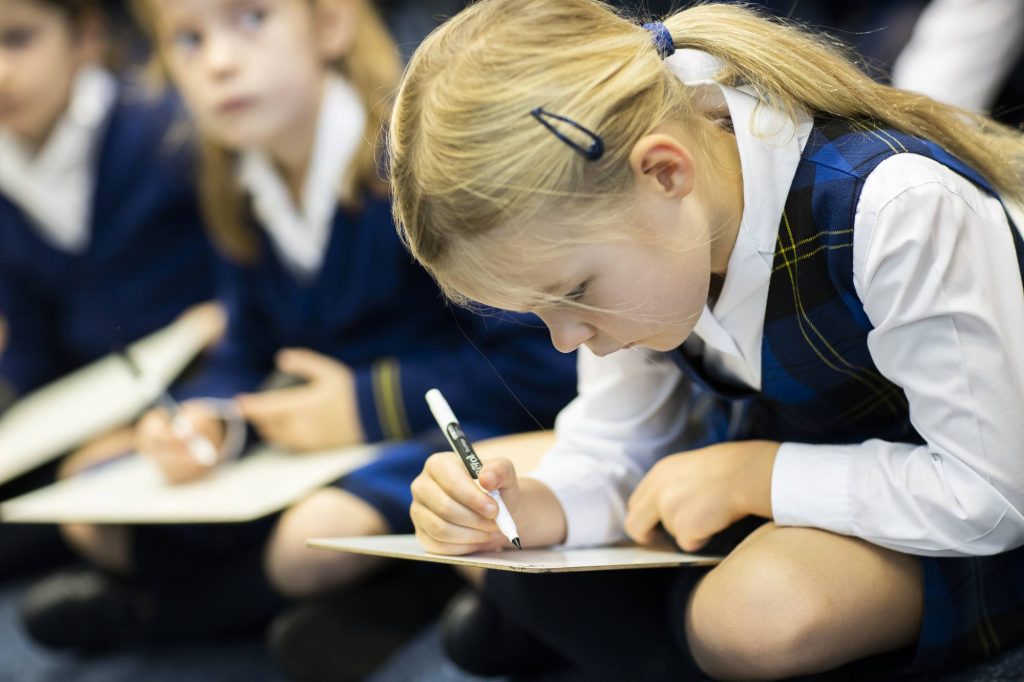
Maths
At Holy Cross Prep our aim is to teach pupils to make sense of mathematics, so that they are able to use and apply it confidently in their everyday lives. Lessons are taught through a carefully structured scheme, which follows the guidelines laid down by the National Curriculum.
The emphasis in the classroom is variety, and stimulating learning through practical activities, problem solving, investigations, games and the development of mental skills and strategies. Each class teacher strives to challenge and inspire every pupil through whole class teaching, group tasks and individual work.
Pupils are taught using a variety of resources; some physical, others abstract, and some that involve IT. In years 5 and 6, the girls work with one-to-one iPads – technology is never far from their fingertips. In lessons pupils use IT to access learning materials, whether this be text book pages or questions via email; to record their learning and show their understanding of taught concepts; or to complete interactive learning tasks.
The girls have access to a variety of online learning platforms; they use Times Table Rock Stars to practise multiplication and division facts; they revise taught concepts through short tests via BOFA, a website that helps in the preparation for senior school; and they learn specific mathematic concepts through Abacus Maths.
Regular homework tasks reinforce class work. In junior classes, pupils are divided into two ability groups to enable the girls to fulfil their potential at the pace best suited to them. Pupils in years 4, 5 and 6 are taught the curriculum from the year ahead.
The girls are prepared for entrance examinations to a wide range of senior schools and, by the end of their time at Holy Cross, our most able pupils are working well above the expected national average for Key Stage 2 in maths.

History
At Holy Cross Prep, our learning intention is to create a lively and exciting history curriculum, in which pupils learn to discover the past for themselves. Handling artefacts and looking at sources encourages children to make individual judgements and observations. Through a wide range of activities, including visits to historical sites, role-play, research, writing e-books and designing animations and posters, children can place themselves in history and make it ‘come alive’.
We inspire curiosity and questioning, encouraging pupils to think critically about the evidence and arguments presented to them. We want our girls to gain a clear understanding of Britain’s past, as well as the wider world. Pupils are equipped with a firm understanding of the challenges and changes different societies have experienced over time, and how these have shaped the society we live in today. We strive to develop a real love of history, alongside outstanding enquiry skills and, most importantly, open minds.

Maths
At Holy Cross Prep our aim is to teach pupils to make sense of mathematics, so that they are able to use and apply it confidently in their everyday lives. Lessons are taught through a carefully structured scheme, which follows the guidelines laid down by the National Curriculum.
The emphasis in the classroom is variety, and stimulating learning through practical activities, problem solving, investigations, games and the development of mental skills and strategies. Each class teacher strives to challenge and inspire every pupil through whole class teaching, group tasks and individual work.
Pupils are taught using a variety of resources; some physical, others abstract, and some that involve IT. In years 5 and 6, the girls work with one-to-one iPads – technology is never far from their fingertips. In lessons pupils use IT to access learning materials, whether this be text book pages or questions via email; to record their learning and show their understanding of taught concepts; or to complete interactive learning tasks.
The girls have access to a variety of online learning platforms; they use Times Table Rock Stars to practise multiplication and division facts; they revise taught concepts through short tests via BOFA, a website that helps in the preparation for senior school; and they learn specific mathematic concepts through Abacus Maths.
Regular homework tasks reinforce class work. In junior classes, pupils are divided into two ability groups to enable the girls to fulfil their potential at the pace best suited to them. Pupils in years 4, 5 and 6 are taught the curriculum from the year ahead.
The girls are prepared for entrance examinations to a wide range of senior schools and, by the end of their time at Holy Cross, our most able pupils are working well above the expected national average for Key Stage 2 in maths.
Religious Education
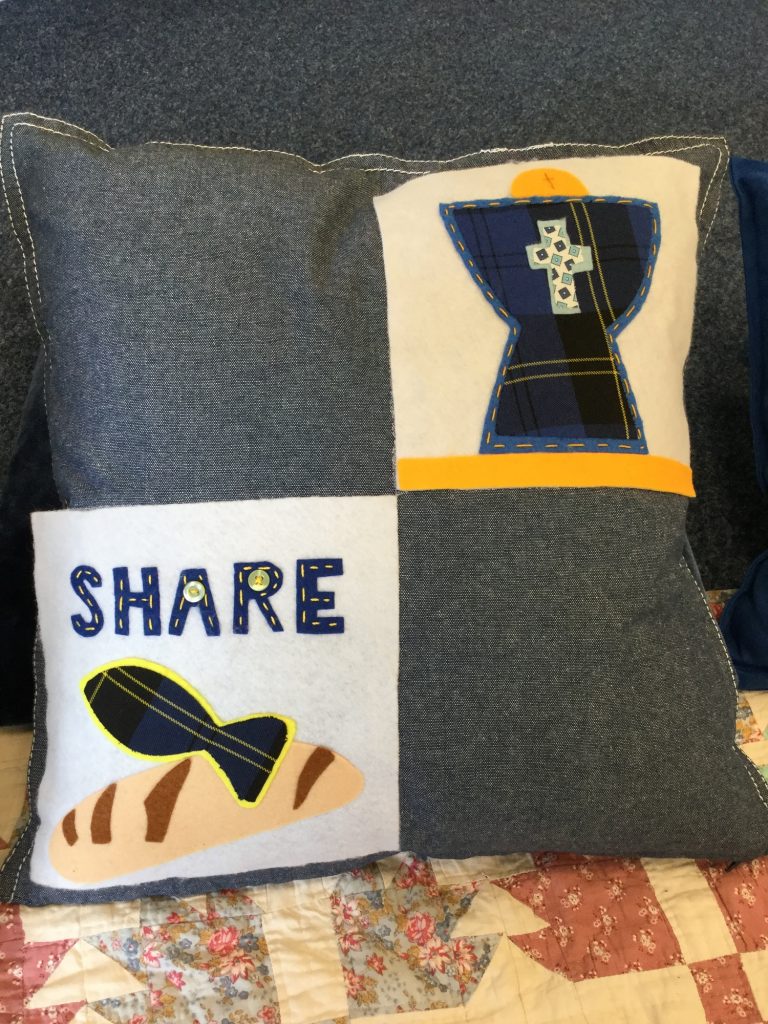
Religious Education
As a Catholic school, the teaching and learning in our Religious Education curriculum is embedded in the Gospel values, as well as in the love which God has for each and every one of us. This underpins the basis of all relationships within the school between child, teacher, parent and all who work in our school community.
A lively and interactive scheme, ‘Come and See’, supports teaching and learning in this area. In the ‘Early Years’, pupils begin by learning about God’s world, His creation and their unique place in it. Later, they come to understand the significance of the Church’s important annual festivals, as well as festivals and practices in other faiths. As the children become more mature, they are taught about inspirational people and begin to explore important issues such as justice and tolerance. In year 3, we help pupils towards an understanding of God’s forgiveness and love, supporting their preparation for the Sacraments of Reconciliation and Holy Communion.
As we draw from a range of other religions and cultures, the study of other faiths is embedded in our scheme of work and we take every opportunity to learn more and share in the faith journeys of our children and their families.
All of these concepts and ideas are taught in a lively, interactive and cross-curricular environment, making excellent use of ICT, role-play activities that bring bible stories and characters to life, art projects, and the writing of short plays and reports. In this way, religious education is set in a meaningful and useful context. For example, the story of Moses and the Exodus can be rewritten as a dramatic newspaper report, using skills learned in English and then performed as an item on a news programme. Cross-curricular tasks provide an excellent opportunity to consolidate learning.
We meet several times a week as a whole school for collective worship; classes write and present their own assemblies for the rest of the school, during which we celebrate the achievements of the girls. On other days, children worship as a class during prayer times at the beginning, middle and end of each day. Important events in the Church’s year are recognised and celebrated through liturgies and Masses, which are prepared and led by teachers and pupils. Parents are warmly invited to share these occasions.
Throughout their time at Holy Cross Prep, pupils are encouraged to relate what they have learned to their own experiences. The overall aim is to unfold for all our pupils, God’s plan for our growth and to help them towards an understanding relationship with Him and His creation.
Science
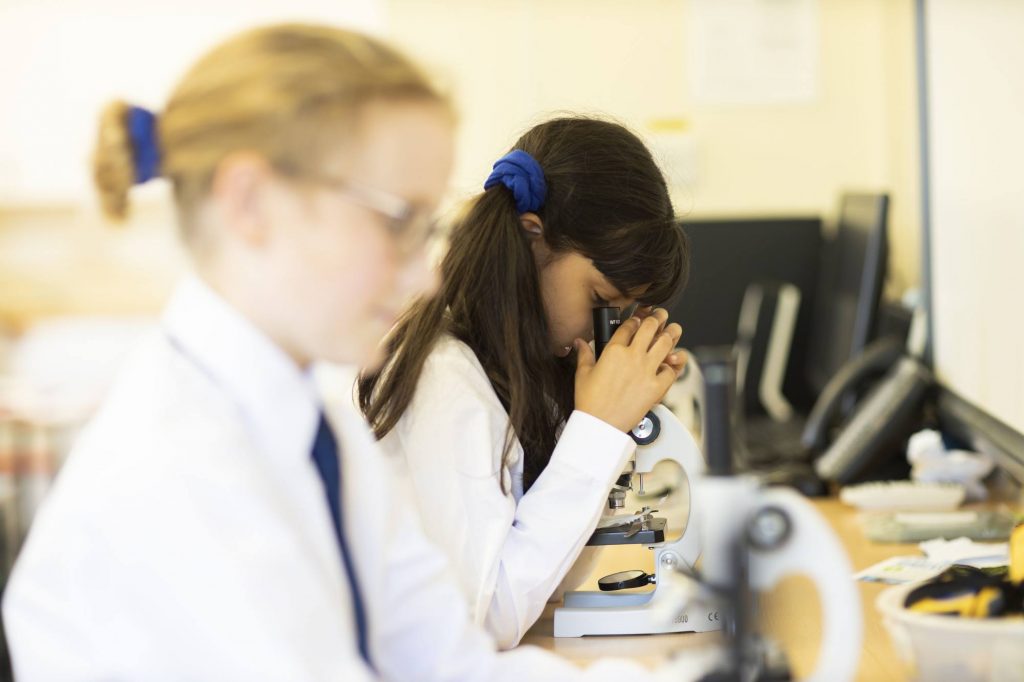
Science
Science at Holy Cross is a core subject and our curriculum is designed to inspire a love of biology, chemistry and physics right from the very start. Through science, we not only build our pupils’ understanding of the world, we also encourage a desire to question, while teaching them essential and transferable skills of learning, investigating, analysing, reasoning and explaining.
We develop our pupils’ scientific knowledge and conceptual understanding through the three scientific strands of biology, chemistry and physics. We ensure pupils are equipped with the scientific knowledge required to understand the uses and implications of science both today and in the future. Our science curriculum builds pupils’ understanding of the value of science in their lives; our goal is to encourage a passion for science that will continue into senior school and influence future career choices. Our scheme of work is based on National Curriculum and embeds STEM in every topic, making knowledge and skills relevant through real-life links and problem-solving investigations.
The girls learn techniques of scientific enquiry from asking questions, planning and carrying out investigations, presenting data, making and communicating conclusions, and evaluating results; as they progress through school, pupils develop a systematic approach to problem solving, building up thinking, patience and resilience.
We have a well-equipped science resource room and we make full use of our extensive grounds, which include our own designated mini-beast area, woodland walk, field and ponds. The curriculum is extended beyond the classroom via regular visits to places of interest, such as Richmond Park, RHS Wisley and Barnes Wetland Centre.
ICT plays a key role in our science teaching, and our curriculum is enriched with the use of relevant technology, which includes data loggers for recording and analysing statistics, and Lego robotics which bring science to life through hands-on tasks and real-world projects. Pupils’ skills are enhanced across science, coding, engineering and technology.
Our aim is to develop a lasting curiosity and enjoyment of science, whilst equipping our pupils with the knowledge and essential skills to enable them to become confident learners who can problem solve, and think both creatively and critically in a modern world.

Religious Education
As a Catholic school, the teaching and learning in our Religious Education curriculum is embedded in the Gospel values, as well as in the love which God has for each and every one of us. This underpins the basis of all relationships within the school between child, teacher, parent and all who work in our school community.
A lively and interactive scheme, ‘Come and See’, supports teaching and learning in this area. In the ‘Early Years’, pupils begin by learning about God’s world, His creation and their unique place in it. Later, they come to understand the significance of the Church’s important annual festivals, as well as festivals and practices in other faiths. As the children become more mature, they are taught about inspirational people and begin to explore important issues such as justice and tolerance. In year 3, we help pupils towards an understanding of God’s forgiveness and love, supporting their preparation for the Sacraments of Reconciliation and Holy Communion.
As we draw from a range of other religions and cultures, the study of other faiths is embedded in our scheme of work and we take every opportunity to learn more and share in the faith journeys of our children and their families.
All of these concepts and ideas are taught in a lively, interactive and cross-curricular environment, making excellent use of ICT, role-play activities that bring bible stories and characters to life, art projects, and the writing of short plays and reports. In this way, religious education is set in a meaningful and useful context. For example, the story of Moses and the Exodus can be rewritten as a dramatic newspaper report, using skills learned in English and then performed as an item on a news programme. Cross-curricular tasks provide an excellent opportunity to consolidate learning.
We meet several times a week as a whole school for collective worship; classes write and present their own assemblies for the rest of the school, during which we celebrate the achievements of the girls. On other days, children worship as a class during prayer times at the beginning, middle and end of each day. Important events in the Church’s year are recognised and celebrated through liturgies and Masses, which are prepared and led by teachers and pupils. Parents are warmly invited to share these occasions.
Throughout their time at Holy Cross Prep, pupils are encouraged to relate what they have learned to their own experiences. The overall aim is to unfold for all our pupils, God’s plan for our growth and to help them towards an understanding relationship with Him and His creation.

Science
Science at Holy Cross is a core subject and our curriculum is designed to inspire a love of biology, chemistry and physics right from the very start. Through science, we not only build our pupils’ understanding of the world, we also encourage a desire to question, while teaching them essential and transferable skills of learning, investigating, analysing, reasoning and explaining.
We develop our pupils’ scientific knowledge and conceptual understanding through the three scientific strands of biology, chemistry and physics. We ensure pupils are equipped with the scientific knowledge required to understand the uses and implications of science both today and in the future. Our science curriculum builds pupils’ understanding of the value of science in their lives; our goal is to encourage a passion for science that will continue into senior school and influence future career choices. Our scheme of work is based on National Curriculum and embeds STEM in every topic, making knowledge and skills relevant through real-life links and problem-solving investigations.
The girls learn techniques of scientific enquiry from asking questions, planning and carrying out investigations, presenting data, making and communicating conclusions, and evaluating results; as they progress through school, pupils develop a systematic approach to problem solving, building up thinking, patience and resilience.
We have a well-equipped science resource room and we make full use of our extensive grounds, which include our own designated mini-beast area, woodland walk, field and ponds. The curriculum is extended beyond the classroom via regular visits to places of interest, such as Richmond Park, RHS Wisley and Barnes Wetland Centre.
ICT plays a key role in our science teaching, and our curriculum is enriched with the use of relevant technology, which includes data loggers for recording and analysing statistics, and Lego robotics which bring science to life through hands-on tasks and real-world projects. Pupils’ skills are enhanced across science, coding, engineering and technology.
Our aim is to develop a lasting curiosity and enjoyment of science, whilst equipping our pupils with the knowledge and essential skills to enable them to become confident learners who can problem solve, and think both creatively and critically in a modern world.


